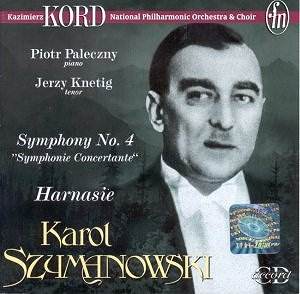This
is one of two Szymanowski CDs from this company. The other
is built around the two violin concertos in excellent performances
by Kaja Danczowska.
The
Symphonie Concertante written just five years before
the composerís death is in three movements. Unlike the recently
reviewed Centaur recording with Mescal Wilson this is in three
tracks. The performance well projects its exuberance and display.
Piotr Paleczny knows the work very well indeed and has recorded
it several times previously. There is a priestly air about this
work - like the fragrant breezes that refresh some Sicilian temple
and this is very well put across in the middle movement. This
work has parallels with Bax's Symphonic Variations (recorded
by Joyce Hatto and recently reissued on Concert Artist - not to
be missed if you like the Szymanowski). Bax , as we know, was
an admirer of Szymanowski's music and it was the Pole who was
the true dedicatee of Bax's Sixth Symphony rather than Boult,
the politically correct one. Other influences or parallels for
this work include de Falla's Nights in the Gardens of Spain.
There is even a Mahlerian grunting double bass ostinato straight
from the First Symphony at 0.57 in the finale. As ever this work
moves with fluid mercurial fantasy from soloistic and chamber
intimacy to hedonistic eruptive ecstasy.
Other
versions of Symphonie Concertante include the 1977 analogue
recording on Polskie Nagrania PNCD 062 by Tadeusz Zmudzinski.
This sounds more analytical and less cocooned than the Accord
version. The piano does not have the lustrous depth experienced
in the Paleczny version. It is rather bare and spare and the violins
sound shrill by comparison with Kord's version of the same orchestra
twenty years later. Rowicki (a world class conductor) who never
made as much progress as he could have manages the quietly expectant
tension of the rhythmic launch of the finale extremely well. Zmudzinski
takes poetry on much the same tack in his 1989 version with Karol
Stryja at Katowice. That version, originally on Marco Polo, now
Naxos, has the perfectly adequate definition of a radio broadcast
rather than the best sound now available. Probably the best recorded
version I know is that with Leif Ove Andsnes (EMI) but it is coupled
with Simon Rattle's King Roger some of the singing on which
is not ideal. If you can live with 1979-80 sound in a cavernous
untamed acoustic then Paleczny's excursion with the Bacchanalian
Polish Radio Nation Symphony Orchestra with Jerzy Semkow is worth
finding. It is more analytical, cooler than the Accord disc, yet
warmer than the Marco Polo and the Polskie Nagrania.
The
ballet Harnasie has been a particular favourite of mine
since hearing the work on an Aurora LP (AUR5064) circa 1978. There
have been several recordings including an incomplete one on an
old Olympia disc which also includes the opera King Roger.
The Marco Polo/Katowice (8.223292) version's virtues are not so
overwhelming that they override the annoyance of having the ballet
in one unmanageable single track running 28.28. The Accord CD
is up against stiff competition with the Wit-conducted EMI version.
Accord's tenor (Jerzy Knetig) is recorded very closely while Wit's
Andrzej Bachleda is quite distant. I am not sure that Szymanowski
ever pulled off a more excitingly climactic piece of writing than
the Entry of the Harnasie and dance complete with its fall
away into chaos. Trumpet writing is extremely demanding, retching
and uprooting. This is overwrought and made truly exciting in
Wit's hands. By the way these Polish EMI versions are drawn from
a 1983 4LP Szymanowski centenary box issued in 1983 (SLS5242).
The contents were reissued across a series of Matrix reissues
and we can hope they will be reissued again perhaps in one of
EMI's bargain boxes (the formula followed for Boult's RVW symphonies
and Berglund's Helsinki cycle). In Kord's case the Accord recording
is overwhelmingly full and is perhaps the most powerfully recorded
version ever although the trumpets do not have the cleanly delineated
presence that they enjoy in the EMI analogue version. Harnasie
is a gift of a work - truly wonderful - a potent amalgam of
folk-naturalism and the modern romantic-impressionistic spirit.
The
notes, which are extensive, are in Polish and idiomatically translated
English. They provide the best exposition I have come across of
the plot to Harnasie. These are made the more attractive
by folk-style woodcuts illustrating the storyline. These have
some of the stark quality of the pugnacious little cartoons that
usually illustrate Jaroslav Hacek's Good Soldier Svejk.
By
the way please do not confuse this record company with the French
outfit, Accord, which is Paris based. This is CD-Accord and based
in Poland. Confusion is possible of course and this is all the
more of a potential problem as both labels are part of the Universal
Music marque.
The
CD Accord recording has a warm embrace which lends a heat haze
to the effulgent chamber textures.
Go
for the CD Accord if you relish power unflinchingly recorded,
warmly rendered. If you need something more analytical then wait
for the EMI to be reissued as it surely will or track down Matrix
15 EMI 5 65307 2.
Rob
Barnett
MusicWeb
is now selling the CDAccord catalogue

![]() for
details
for
details